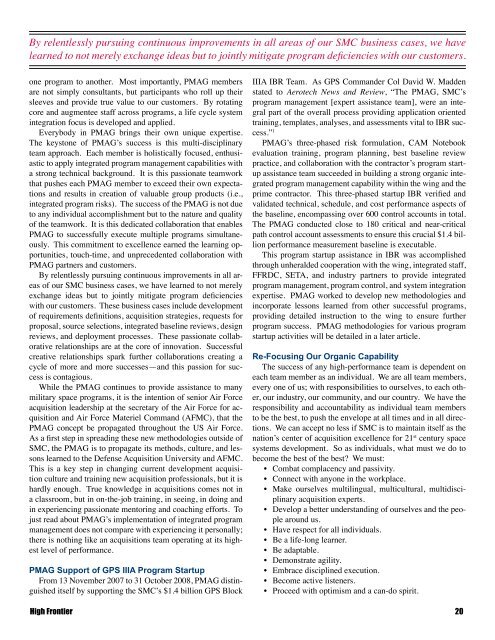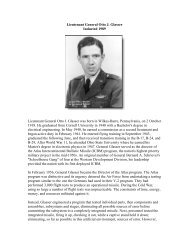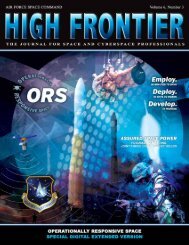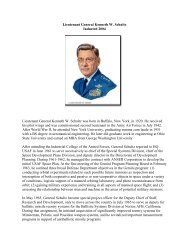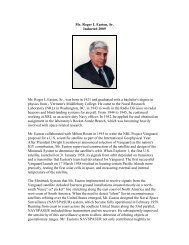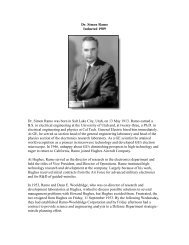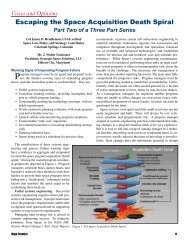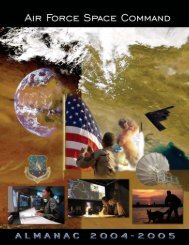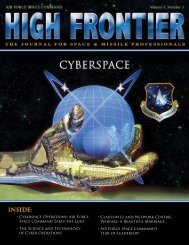Space Acquisition - Air Force Space Command
Space Acquisition - Air Force Space Command
Space Acquisition - Air Force Space Command
You also want an ePaper? Increase the reach of your titles
YUMPU automatically turns print PDFs into web optimized ePapers that Google loves.
By relentlessly pursuing continuous improvements in all areas of our SMC business cases, we have<br />
learned to not merely exchange ideas but to jointly mitigate program deficiencies with our customers.<br />
one program to another. Most importantly, PMAG members<br />
are not simply consultants, but participants who roll up their<br />
sleeves and provide true value to our customers. By rotating<br />
core and augmentee staff across programs, a life cycle system<br />
integration focus is developed and applied.<br />
Everybody in PMAG brings their own unique expertise.<br />
The keystone of PMAG’s success is this multi-disciplinary<br />
team approach. Each member is holistically focused, enthusiastic<br />
to apply integrated program management capabilities with<br />
a strong technical background. It is this passionate teamwork<br />
that pushes each PMAG member to exceed their own expectations<br />
and results in creation of valuable group products (i.e.,<br />
integrated program risks). The success of the PMAG is not due<br />
to any individual accomplishment but to the nature and quality<br />
of the teamwork. It is this dedicated collaboration that enables<br />
PMAG to successfully execute multiple programs simultaneously.<br />
This commitment to excellence earned the learning opportunities,<br />
touch-time, and unprecedented collaboration with<br />
PMAG partners and customers.<br />
By relentlessly pursuing continuous improvements in all areas<br />
of our SMC business cases, we have learned to not merely<br />
exchange ideas but to jointly mitigate program deficiencies<br />
with our customers. These business cases include development<br />
of requirements definitions, acquisition strategies, requests for<br />
proposal, source selections, integrated baseline reviews, design<br />
reviews, and deployment processes. These passionate collaborative<br />
relationships are at the core of innovation. Successful<br />
creative relationships spark further collaborations creating a<br />
cycle of more and more successes—and this passion for success<br />
is contagious.<br />
While the PMAG continues to provide assistance to many<br />
military space programs, it is the intention of senior <strong>Air</strong> <strong>Force</strong><br />
acquisition leadership at the secretary of the <strong>Air</strong> <strong>Force</strong> for acquisition<br />
and <strong>Air</strong> <strong>Force</strong> Materiel <strong>Command</strong> (AFMC), that the<br />
PMAG concept be propagated throughout the US <strong>Air</strong> <strong>Force</strong>.<br />
As a first step in spreading these new methodologies outside of<br />
SMC, the PMAG is to propagate its methods, culture, and lessons<br />
learned to the Defense <strong>Acquisition</strong> University and AFMC.<br />
This is a key step in changing current development acquisition<br />
culture and training new acquisition professionals, but it is<br />
hardly enough. True knowledge in acquisitions comes not in<br />
a classroom, but in on-the-job training, in seeing, in doing and<br />
in experiencing passionate mentoring and coaching efforts. To<br />
just read about PMAG’s implementation of integrated program<br />
management does not compare with experiencing it personally;<br />
there is nothing like an acquisitions team operating at its highest<br />
level of performance.<br />
PMAG Support of GPS IIIA Program Startup<br />
From 13 November 2007 to 31 October 2008, PMAG distinguished<br />
itself by supporting the SMC’s $1.4 billion GPS Block<br />
IIIA IBR Team. As GPS <strong>Command</strong>er Col David W. Madden<br />
stated to Aerotech News and Review, “The PMAG, SMC’s<br />
program management [expert assistance team], were an integral<br />
part of the overall process providing application oriented<br />
training, templates, analyses, and assessments vital to IBR success.”<br />
1<br />
PMAG’s three-phased risk formulation, CAM Notebook<br />
evaluation training, program planning, best baseline review<br />
practice, and collaboration with the contractor’s program startup<br />
assistance team succeeded in building a strong organic integrated<br />
program management capability within the wing and the<br />
prime contractor. This three-phased startup IBR verified and<br />
validated technical, schedule, and cost performance aspects of<br />
the baseline, encompassing over 600 control accounts in total.<br />
The PMAG conducted close to 180 critical and near-critical<br />
path control account assessments to ensure this crucial $1.4 billion<br />
performance measurement baseline is executable.<br />
This program startup assistance in IBR was accomplished<br />
through unheralded cooperation with the wing, integrated staff,<br />
FFRDC, SETA, and industry partners to provide integrated<br />
program management, program control, and system integration<br />
expertise. PMAG worked to develop new methodologies and<br />
incorporate lessons learned from other successful programs,<br />
providing detailed instruction to the wing to ensure further<br />
program success. PMAG methodologies for various program<br />
startup activities will be detailed in a later article.<br />
Re-Focusing Our Organic Capability<br />
The success of any high-performance team is dependent on<br />
each team member as an individual. We are all team members,<br />
every one of us; with responsibilities to ourselves, to each other,<br />
our industry, our community, and our country. We have the<br />
responsibility and accountability as individual team members<br />
to be the best, to push the envelope at all times and in all directions.<br />
We can accept no less if SMC is to maintain itself as the<br />
nation’s center of acquisition excellence for 21 st century space<br />
systems development. So as individuals, what must we do to<br />
become the best of the best We must:<br />
• Combat complacency and passivity.<br />
• Connect with anyone in the workplace.<br />
• Make ourselves multilingual, multicultural, multidisciplinary<br />
acquisition experts.<br />
• Develop a better understanding of ourselves and the people<br />
around us.<br />
• Have respect for all individuals.<br />
• Be a life-long learner.<br />
• Be adaptable.<br />
• Demonstrate agility.<br />
• Embrace disciplined execution.<br />
• Become active listeners.<br />
• Proceed with optimism and a can-do spirit.<br />
High Frontier 20


